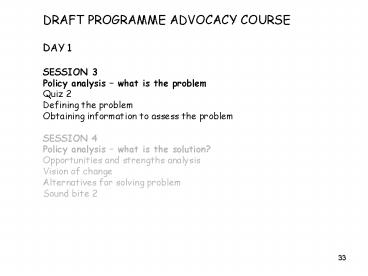DRAFT PROGRAMME ADVOCACY COURSE PowerPoint PPT Presentation
1 / 24
Title: DRAFT PROGRAMME ADVOCACY COURSE
1
DRAFT PROGRAMME ADVOCACY COURSE DAY 1 SESSION
3 Policy analysis what is the problem Quiz
2 Defining the problem Obtaining information to
assess the problem SESSION 4 Policy analysis
what is the solution? Opportunities and strengths
analysis Vision of change Alternatives for
solving problem Sound bite 2
2
- As alcohol consumption declines
- The number of jobs in the alcohol sector will
always decline - The number of jobs in the alcohol sector will not
change - The number of jobs in the alcohol sector may
increase
3
- More than 70 of the worlds alcohol exports
comes from countries of the EU. The proportion of
EU alcohol exports by value to countries outside
the EU is - More than 75
- Less than 25
- 100
- Between 50 and 75
- Between 25 and 50
4
- Taxes on alcohol should not be increased, because
the amount of money that the government gets in
from tax will decrease - True
- False
5
- Each year, in real money terms, alcohol costs the
European Union about - EUR125 million
- EUR 2.5 billion
- EUR 125 billion
- EUR 50 billion
- EUR 234 billion
6
- Each year, the total value of pain, suffering and
lost life from alcohol in the European Union is
about - EUR125million
- EUR 55 billion
- EUR 270 billion
- EUR 400 billion
- EUR 135 billion
7
- As alcohol consumption declines
- The number of jobs in the alcohol sector will
always decline - The number of jobs in the alcohol sector will not
change - The number of jobs in the alcohol sector may
increase
8
Consumption and employment
Italy - bars
Finland - HoReCa
9
- More than 70 of alcohol exports comes from
countries of the EU. The proportion of EU alcohol
exports by value to countries outside the EU is - More than 75
- Less than 25
- 100
- Between 50 and 75
- Between 25 and 50
10
(No Transcript)
11
- Taxes on alcohol should not be increased, because
the amount of money that the government gets in
from tax will decrease - True
- False
12
Consumption and tax
13
- Each year, in real money terms, alcohol costs the
European Union about - EUR125 million
- EUR 2.5 billion
- EUR 125 billion
- EUR 50 billion
- EUR 234 billion
14
Total tangible costs 125bn
15
- Each year, the total value of pain, suffering and
lost life from alcohol in the European Union is
about - EUR125million
- EUR 55 billion
- EUR 270 billion
- EUR 400 billion
- EUR 135 billion
16
- Intangible putting a value on quality of life,
pain, being alive - Total intangible costs 270bn
17
Source Advocacy Center at ISC.
http//www.advocacy.org/
18
Checklist to identify issue or problem
Source Advocacy Center at ISC.
http//www.advocacy.org/
19
Identify an Issues Life Cycle Stage and the Next
Steps for Advocates
Source Advocacy Center at ISC.
http//www.advocacy.org/
20
- DEFINE THE PROBLEM
- What is the problem?
- Why is it a problem?
- Why is it a public problem?
- Identify the problems stage and why?
21
- RESEARCH FOR ADVOCACY
- What policy goal does this research address?
- Is this research appropriate to the policy goal?
- Will my research be done in time to meet my
policy objectives? - How will I use the results to advocate for that
policy goal - Is there another (cheaper, easier, more
effective) way to gain the same results?
22
- Types of Research for Advocacy
- Opinion polls/Surveys
- Economics research
- Review of alcohol industry websites and actions
- Qualitative research
23
- Presenting your research
- Communicate the results directly with
policymakers. - Hold a press conference.
- Invite members of the press to come to a meeting
at your office to discuss the results. - Call one journalist with whom you have a good
relationship, or who has written on alcohol
control, and giving him/her exclusive rights to
the research, - Write a press release and fax/send it to various
media. - Refer to your findings in letters to the editor,
letters to politicians, speeches. - Share your resultsif not a formal report, at
least the key findings, which may be all that
most people read anyway with other organizations
potentially interested in alcohol control.
24
- Specific suggestions on research to conduct to
meet advocacy objectives - Your advocacy objectives should guide your
research. Start with what information you need to
press for a certain policy change then plan your
research. - Test the questions before use, to make sure they
are clear. - Decide which questions you need and which you do
not. - Plan your data analysis in advanceif you will
use a computer, set up the form on the computer
before you conduct the survey. Make sure you have
the time and ability to do the analysis. - Only do the survey if you know how it will be
useful for you. - Remember to tie the results in to your policy
initiatives.

